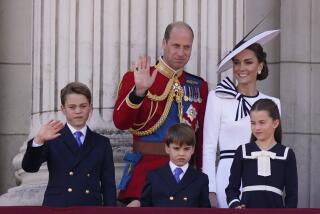Girl power! The royal baby and history’s what-ifs
It was late October 2011, and their royal highnesses the Duke and Duchess of Cambridge were still in honeymoon mode when Britain and its Commonwealth agreed that the first baby Cambridge, boy or girl, would become the future monarch.
This is a bigger deal than you think. For nearly 1,000 years, the dumbest, least able royal boy was regarded as better monarch material than the smartest royal girl. A princess only got to become the sovereign if all her brothers died or were killed. Nice, eh? Britain’s six queens regnant -- two Elizabeths, two Marys, one Victoria and one Anne -- got the job only because the royal line had run out of boys.
A thoroughly modern monarchy could not countenance such a thing, so a year before the conception of the imminent Cambridge baby, Britain’s act of succession was changed. Girls can rule -- first. If William and Kate’s baby is female, she’ll become Britain’s seventh queen regnant.
Quiz: How well do you know Will and Kate?
Not radical to you and me, maybe, but it sure is to the monarchy.
How different might British history, and European history, have been if this “girls rule” rule had always been in place? If kings hadn’t been so eager to beget little kings?
England’s early kings spawned a pretty good supply of royal boys until the upstart Tudor family came along. If the girls-rule rule had been in place when that serial monogamist Henry VIII became king in 1509, he might have had only one wife instead of six.
Henry’s first wife, Catherine of Aragon, gave birth to a girl, Mary. Those other five wives wouldn’t have been wedded, beheaded, annulled or died for being Mrs. Henry VIII. And we might be talking about the Marian Age, for Mary Tudor, not the Elizabethan Age, for Elizabeth Tudor, who would never have been born.
Much more important for England, fat old Henry wouldn’t have needed a new wife and another shot to beget a son, so he wouldn’t have needed to break with the Roman Catholic Church. The Church of England -- created to help Henry VIII secure power over his subjects’ spiritual lives and his own marital needs -- might not exist today. If Henry had regarded his daughter Mary as an acceptable heir, England might be still Catholic, Protestantism might have been a sect, not a force, and the map of Europe would be different.
The girls-rule rule could have changed Britain more recently too. The first of Queen Victoria’s nine children was a daughter, also Victoria. The studious, serious little Vicky, not her charming, libertine little brother Edward, would have inherited the throne.
That means Vicky probably would not have married the crown prince of Prussia, nor given birth to the horrid little boy who became Kaiser Wilhelm II, whose posturing and saber-rattling put the fuse to World War I. Is it too fanciful to imagine that, without the ridiculous, dangerous Kaiser Bill, there might have been no World War I, no burdensome postwar reparations yoked onto Germany, no sullen, opportunistic, anti-Semitic corporal named Adolf Hitler, no World War II, no Holocaust …
Yes, I suppose I get carried away.
The British nobility, however, should not. While royal princesses can now inherit the kingdom, merely aristocratic girls still cannot. Just like “Pride and Prejudice,” just like “Downton Abbey,” the upper classes are still desperate to have boys because girls can’t inherit their daddies’ titles.
Another reminder that on the chessboard of British life, it’s the queen who’s the most powerful figure around. And there are no other women in the game.
ALSO:
Ryan Coogler, the man behind ‘Fruitvale Station’
Rolling Stone nails it with its Dzhokhar Tsarnaev cover
Best financial advice for McDonald’s employees: Leave
More to Read
A cure for the common opinion
Get thought-provoking perspectives with our weekly newsletter.
You may occasionally receive promotional content from the Los Angeles Times.











